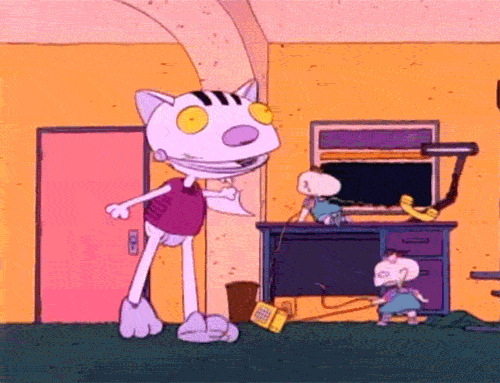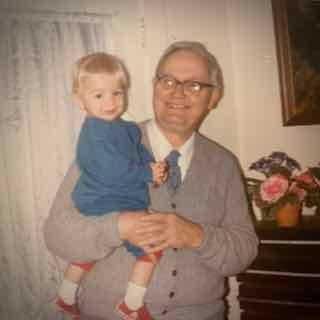Welcome to the Quarantine Creatives newsletter, a weekly companion to my podcast of the same name, which explores creativity, art, and big ideas as we continue to live through this pandemic.
If you like what you’re reading, you can subscribe for free to have this newsletter delivered to your inbox on Sundays:
How Old Are You?
I’ve been writing a lot about nostalgia lately, and today is an interesting riff on this idea- what does it mean to be old?
My kids have discovered the classic Nickelodeon cartoon Rugrats and it has been a trip down memory lane. Rugrats premiered in 1991. It ran for nine seasons, spawned a spin-off, and even a few theatrical films. The show follows the adventures of a group of babies and includes stories about their extended families.
It has been interesting to revisit a show that I first watched as a child and see it through my kids’ eyes. There are lots of characters and lessons that still hold up, but there’s also a lot that I realize doesn’t resonate as strongly with my kids as it did with me.
Case in point: Grandpa Lou Pickles.
Grandpa Lou is known for watching the fishing channel on TV, falling asleep at inopportune times, and telling stories about what life was like when he was growing up and had to walk 15 miles to get anywhere he wanted to go. He’s balding, wears a conspicuous hearing aid, and talks as though there’s few teeth left in his mouth. In other words, he’s an old man.
It’s strange to think that Grandpa Lou was so relatable to me as a child but that to my kids, he’s a caricature from another time. As I’ve been thinking about this over the past week or so, it has occurred to me that there aren’t a lot of “old” people in their lives.
Of course, my kids know plenty of people of an advanced age. It’s just that even friends or family members in their 80s or beyond don’t seem as old as they used to.
My grandparents looked and felt very old when I was born, even though they were both in their mid-50s. They wore old people glasses, drove a massive old car (a Chevy Caprice Classic), and had old people furniture and carpet in their house.
As I approach 40, I would hardly consider somebody in their 50s to be “old,” but my grandparents just seemed ancient to me. I don’t even know what the threshold is for when I would consider somebody old anymore- 75, 85, 95? Certainly not 55.
It seems like what we consider “old” has changed dramatically over time, at least when it comes to popular entertainment.
Anne Bancroft seduced Dustin Hoffman as Mrs. Robinson in The Graduate. She was 36 at the time (he was 30), yet she was supposedly playing the mother of a college age girl. Is that good acting? Great wardrobe and makeup? All that booze and cigarettes of a bygone era that made younger people look much older?
In the classic Hitchcock thriller North By Northwest, Jessie Royce Landis plays Cary Grant’s mother, despite being only 8 years older than him in real life.
There are plenty of famous “old people” on classic TV shows that seem young by today’s standards. Ann B. Davis was 43 when she started playing Alice on The Brady Bunch. Carroll O’Connor and Jean Stapleton were both in their late 40s when they appeared as the Bunkers on All In The Family. Vicki Lawrence was 34 when Mama’s Family premiered, and she had already been playing the Mama character for a few years on The Carol Burnett Show.
These days, there are many actors working at ages that would’ve been unthinkable a generation ago. Harrison Ford is 79, Morgan Freeman is 84, and Meryl Streep is 72, just to name a few.
Betty White recently passed away just shy of her 100th birthday, but she is most famous for portraying an “old lady” in The Golden Girls at age 63. She spent 46 years of her life being seen as “old.” I find it hard to see that happening in modern times.
Senior Senators
Beyond the world of movies and TV shows, politics is also a place where the age that people serve seems to keep increasing.
When Joe Biden was inaugurated in 2021, he was the oldest person ever to take the oath of office at 78. Four years earlier, Donald Trump was the previous record holder for oldest person inaugurated as president at 70.
Elizabeth Warren recently announced that she will run for reelection to her senate seat in 2024, when she will be 75. Bernie Sanders has not ruled out another run for president in 2024, when he will be 83.
Now, in fairness, Bernie Sanders looks like what I think of when I think of an “old man,” but both he and Elizabeth Warren have built big support from young people for their stances on progressive issues. Older in age perhaps, but with a younger soul.
The San Francisco Chronicle reported last month on concerns that 88 year old senator Dianne Feinstein no longer has the mental faculties to serve effectively, yet at the moment, she’s still in office. This is one of the rare times where the fitness of an older politician gains any traction. After all, Chuck Grassley (also 88) tweets strange things pretty regularly but there’s very little discussion about if he should step down.

2002
When I was coming of age in the 1990s, there was a big wave of nostalgia for the 1970s. Dazed and Confused, The Brady Bunch Movie, and That 70s Show were all big hits. Bands like Fleetwood Mac and The Bee Gees were releasing new albums. There was a desire in the marketplace for what came 20 years before.
Pixar’s new film Turning Red was deliberately set in 2002, but it hardly felt nostalgic, at least to me. Aside from a few differences in technology (the use of a camcorder and a Discman) and the popularity of a boy band, much of it feels very current.
A lot has changed in the last twenty years: the iPhone and social media didn’t exist back then. Yet, at the same time, 2002 feels like it was about 5 years ago.
It’s hard for me to determine whether what I’m feeling about aging is just a function of me getting older or if this is a larger cultural trend. I’ve heard the sentiment expressed by several people that the last 20 years have been a bit of a blur.
In history class, we charted our past through a series of wars- The Revolutionary, The Civil, WWI, WWII. They were the mile markers by which we measured our journey, at least as Americans.
It’s hard to imagine a victory parade in Times Square at the end of any war in the modern era. Wars no longer even have a start date or end date. Congress never declares of war anymore. The conflicts in which we are involved drag on for decades with an unclear goal and no real sense of victory.
Many of the personal events that we once used to gauge time are also gone. We no longer get married, buy houses, and have kids at the same stages in life. Between high home prices and student loan debt, many of my generation may never own a home, or at least will own one much later than a Baby Boomer did.
We are less religious than we once were too, meaning ceremonies like First Communions, Baptisms, and Bar Mitzvahs are happening less. As these traditions and milestones fade away, time becomes more elastic.
And when time becomes less important, maybe age does too.
Perhaps my perception of “old” was shaped more by Archie Bunker or Mrs. Robinson, but those old people were fabricated in several ways. My own grandparents may have just seemed old because I was a little kid.
The old trope that age is just a number is true. You can be as old (or young) as you want, based solely on how you perceive yourself.
Related Reading
If you’d like to catch up on past episodes of the Quarantine Creatives podcast, they can be found on Apple Podcasts, Spotify, or wherever you listen.
Please consider sharing this with a friend that you think might enjoy it, or better yet, share it on social media so you can tell hundreds of friends!
If you’ve missed past issues of this newsletter, they are available to read here.
Stay Safe!
Heath










